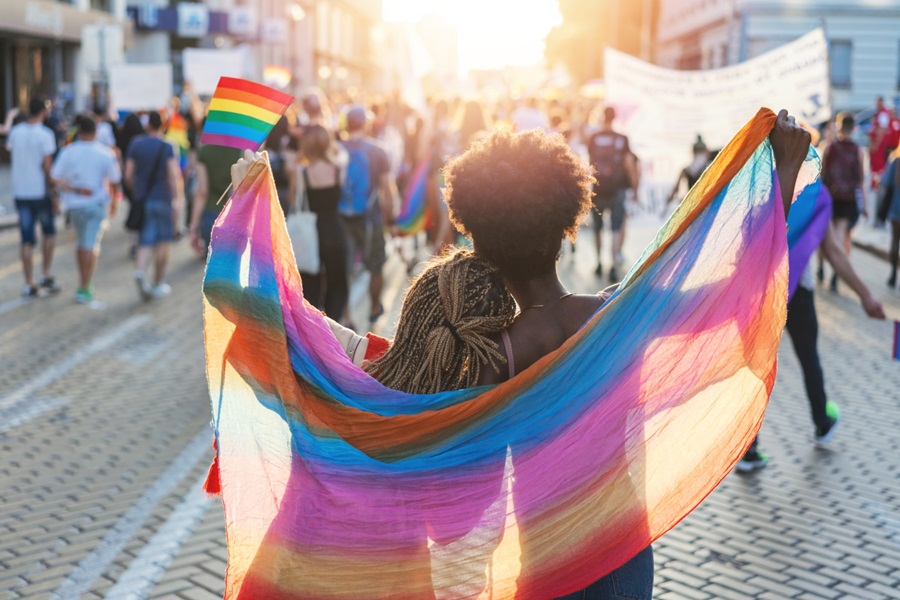Attendees showed up with openness and curiosity for the conversation between Chair of Profiles and global Pride ERG Executive Sponsor Caroline Frankum, included in the Pride Power List 25 Corporate Allies featured in The Guardian; and Kantar client Tim Hulbert, Managing Director and Global Head of Insight, Planning & Brand Strategy at Standard Chartered Bank. They inspired, challenged and uplifted by reminding us that allyship is about everyday actions, creating space for authenticity and inclusion that truly supports colleagues bringing their full selves to work. Here are their top 10 tips:
“There is no greater agony than bearing an untold story inside you.” – Maya Angelou
• Lean in and help
• Assume good intent
• Use your privilege to speak up for others if they want you to
• Ask questions to understand, not to judge
Allyship extends to any minority: “If you’re a man, stand up for women. If you’re white, fight for Black colleagues. It’s often easier for allies to raise issues without facing the same judgement.”
Key takeaways:
Authenticity is a journey, not the destination. So is allyship.
The definition of allyship has evolved over the years and it’s the quiet, consistent choices we make that often speak the loudest. But to be true allies we need to do the hard work to understand experiences that are different to our own, and to stand beside anyone who needs support. To show up and signal, in ways big and small, “you belong here.”
So, wear a rainbow bracelet, whether you are part of the LGBTQIA+ community or not. Add your pronouns to your email signature. Call out bias, even when it’s subtle. Often, that’s all that’s needed to signify you’re someone who will offer safety, solidarity, and respect. Because that’s the true definition of allyship today.
1. Understand that identity is a journey
Tim’s path to self-discovery was not linear. From early confusion and societal pressure to a 20-year loving marriage with his wife before embracing life as a gay man in COVID times, his story highlights that identity evolves over time. Respecting this journey in others is a key part of allyship and resonates with one of Caroline’s favourite quotes:“There is no greater agony than bearing an untold story inside you.” – Maya Angelou
2. Recognising the power of representation
Tim reflected on how creativity was one of the few ‘life spaces’ he felt he had to hide his true self. Admitting to enjoying Whitney Houston music or baking felt risky. Representation matters because it normalises diverse experiences and identities, reducing the burden of masking and constant self-censorship, which is in turn a critical to creating the psychological safety that enables people to be their true, authentic selves across all dimensions of life.3. Coming out is not a one-time event
Tim shared the reality of “coming out every day” when stepping up to correct assumptions, navigate conversations, and decide what to share, and when to share it. Allies can help by nurturing inclusive environments where people don’t have to explain themselves, as well as by not making assumptions (such as whether someone has a husband or a wife). Adding your pronouns to your Teams profile is an example of actively taking a a step towards inclusion as it encourages others to share theirs.4. Supporting rainbow families
Tim’s experience parenting his three daughters shows the importance of ongoing, open, honest conversations. His children’s reactions to his coming out were all heartfelt, but also different – ranging from immediate acceptance to growing acceptance over time. He also noted how humour can be an important healer and enabler to acceptance at home Parents of LGBTQIA+ children may want to have a refresher of our Disruption Talks recording on rainbow parenting.5. Finding new ways of being a role model under difficult contexts
Being gay is still illegal in some of the markets we operate in as a business, so it may not be safe to live our authentic selves there. Tim spoke of using gender-neutral language to protect himself and others in these locations when travelling. He emphasised that being more private in these situations doesn’t mean being inauthentic, it’s sometimes necessary to do so. But in safer spaces, he feels a duty to be visible for others who may be struggling. Being an ally requires awareness of these contexts and how best to support the community.6. Creating psychologically safe workplaces
Tim advocates for corporate cultures where people don’t assume heterosexuality and where it’s okay to ask respectful questions. Generational differences mean it’s sometimes a case of ‘waiting for the hair dye to grow out’, as Caroline stressed that younger generations are already leading the change by being more DEI-focused and driven-, so businesses must catch up. We therefore need to ensure awareness of our ERGs as the spaces for these often-difficult conversations to keep building psychological safety and spread the word beyond these sometimes-siloed community groups.7. Being an active ally
Allyship is about intention rather than perfection. Tim encourages allies to:• Lean in and help
• Assume good intent
• Use your privilege to speak up for others if they want you to
• Ask questions to understand, not to judge
Allyship extends to any minority: “If you’re a man, stand up for women. If you’re white, fight for Black colleagues. It’s often easier for allies to raise issues without facing the same judgement.”
8. Celebrate non-trauma representation
Role models and representation matter in leadership, in storytelling, and in the brands we build. Tim praised brands that show LGBTQIA+ people in everyday, joyful contexts as representation doesn’t always need to be dramatic. This is a great learning for clients looking to get started on their brand allyship journey.9. Build inclusive brands
With a global LGBTQIA+ buying power of $3.9 trillion, our Brand Inclusion Index proves brands that embrace inclusion are not only doing the right thing, they’re making smart business decisions. Tim admires brands like Gucci for their bold support of gender fluidity.10. Lead with kindness
Tim’s legacy goal is simple: to be kind. Inspired by his father, he believes kindness is a superpower in all aspects of life. Whether through leadership, parenting, or friendship, he wants to help others feel safe being themselves.Key takeaways:
Authenticity is a journey, not the destination. So is allyship.
The definition of allyship has evolved over the years and it’s the quiet, consistent choices we make that often speak the loudest. But to be true allies we need to do the hard work to understand experiences that are different to our own, and to stand beside anyone who needs support. To show up and signal, in ways big and small, “you belong here.”
So, wear a rainbow bracelet, whether you are part of the LGBTQIA+ community or not. Add your pronouns to your email signature. Call out bias, even when it’s subtle. Often, that’s all that’s needed to signify you’re someone who will offer safety, solidarity, and respect. Because that’s the true definition of allyship today.

